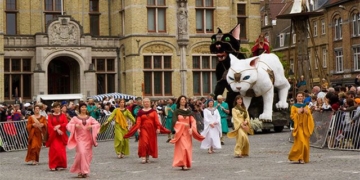According to Ancient Origins, a large-scale brewing technology developed 4,000 years ago is astonishing in itself, but its mysterious ripple effects on human civilization are even more shocking.
A recent study published in Archaeological and Anthropological Sciences has delved into the historical period 4,000 years ago associated with the mass production of red rice beer, a beverage celebrated for its ability to “enhance the mind” and embody a “sacred red color.”

Ancient jars used for beer by generations of Chinese people over millennia – (Photo: ANCIENT ORIGINS)
Not only did it create a revolution in beverages and a new social habit, but mass beer production also stimulated vibrant trade among communities during the Neolithic era. This exchange led to the sharing of knowledge, which in turn sparked an unexpected leap in civilization.
The civilization 4,000 years ago in China has long amazed researchers with remnants of cities that exhibit many “timeless” features, such as sophisticated infrastructure, water supply systems, drainage, irrigation, and complex ritual structures…
“The new social connections created by certain cultural practices sowed the seeds for larger, more advanced, and more ambitious civilizations to emerge. It was the mass production of beer in China thousands of years ago that provided the ‘ingredients’ for large gatherings that held social value” – Ancient Origins quotes the analysis from a research team from China and the United States.
The Daweibkou Culture of China, established by settlers in the present-day Shandong region 4,600 to 6,700 years ago, is believed to be the culture that invented the recipe for red rice beer, facilitating mass beer production.
They brewed beer in large clay vessels known as dakougang, representing a significant advancement in the technology of brewing.
“Dakougang has not been found in every settlement but primarily appears in large burial sites of the elite. It is unclear exactly where dakougang was produced and whether it was traded as a commercial item,” said Professor Li Liu, a Chinese archaeology expert at Stanford University and co-author, in an interview with South China Morning Post.
At that time, the Neolithic elite in China competed for status by hosting large public feasts, where red rice beer was the “soul”.


















































